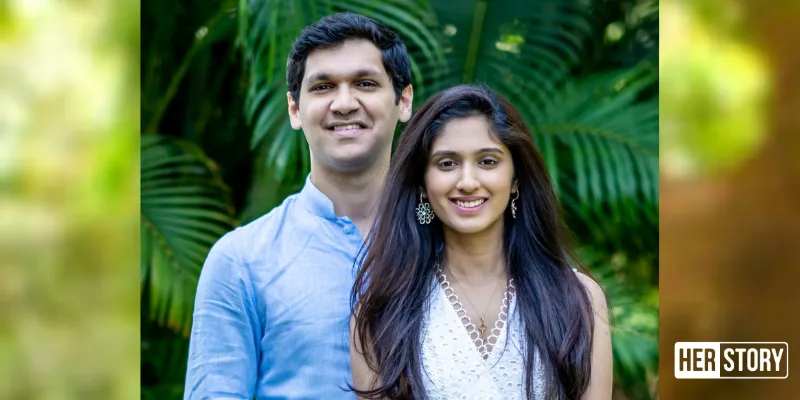Pivot and Persist: How this apparel startup branched into PPE kits and now supplies to over 250 hospitals
Serial entrepreneur Vanshika Choudhary and her husband Abhijeet Kaji are using their apparel manufacturing facilities to supply DRDO-certified PPE kits to over 250 hospitals in India.
In March 2020, entrepreneur Vanshika Choudhary shifted base from Delhi to Mumbai to manage her two apparel startups. Founded in August 2017, B2C ecommerce platform KYNA caters to working women while KNYA Uniforms sells uniforms to restaurants, hotels, schools, and a few hospitals.
With the pandemic, came the uncertainty of where the businesses was headed.
“We had almost 500 restaurants, hotels, and schools as our clients. Things changed overnight when COVID-19 hit India,” she tells HerStory.
When social gatherings became a threat and restaurants did not entertain diners anymore, Vanshika knew that these businesses would not invest in uniforms. With courier companies not being available for delivery, the B2C brand remained stagnant.
At the time, Vanshika’s husband Abhijeet Kaji got in touch with his friends in China and the US and learned about the immediate need for Pesonal Protective Equipment (PPE) in countries where the COVID-19 spread was quite advanced.
The World Health Organisation was also urging industry and governments to increase PPE manufacturing by 40 percent to safeguard healthcare workers.
The surge of COVID-19 scare was only beginning in India and the entrepreneurs learnt that manufacturing PPE kits was possible with its existing infrastructure – in manufacturing units in Bhiwandi, Mumbai and Vapi, Gujarat.
“Every day, there were headlines of PPE and imports being banned and that is when we started educating ourselves about the material, usage and how to make it because it is a very specialised product. We had to be very careful because we are responsible for the people wearing them,” Vanshika says.
The duo launched KNYA MED and started supplying to PPE kits to a few hospitals in Mumbai, mostly existing clients of KNYA Uniforms.
In the last eight months, their latest venture of B2B medical apparel has supplied almost 6 lakh PPE kits to over 250 hospitals. They have also diversified the product offering to include medical bedsheets, operation theatre gowns, medical scrubs, and disposable bed sheets and gowns.
The products are priced between Rs 300 and Rs 700, and 25 percent of KNYA MED’s revenues are donated to meet the needs of areas heavily hit by COVID-19. It counts on hospital chains like Fortis, Apollo, Max Hospitals across Ahmedabad, Delhi, Kolkata, Bengaluru, among others for support.
Every part of the equipment is certified by Defence Research and Development Organisation (DRDO). This includes the quality of fabric that does not allow blood penetration and ensures there are no holes in the seams and stitches for blood to pass.
Earlier this year, Abhijeet who holds an MBA from Stanford University, joined Vanshika as co-founder.

Abhijeet Kaji and Vanshika Choudhary, Co-founders of KNYA, KNYA Uniforms, and KNYA MED
From consumer market to B2B
Born and raised in Delhi, Vanshika hails from a Marwari family that runs a textiles business. In 2015, she completed her bachelor’s degree in fashion media and industries from LASALLE College of Arts in Singapore, where she learnt all aspects of fashion entrepreneurship and brand building.
With the launch of KNYA targeting working women, the entrepreneur started experimenting and designed apparel from fabrics made out of eucalyptus flowers.
Started with an initial investment of Rs 1 lakh, the apparel featuring simple and minimal designs, are priced between Rs 1,200 and Rs 3,500.
"As the brand grew organically, small hotels enquired if we could make uniforms for receptionists and waiters. I ignored these queries for a year before we saw a huge growth opportunity because there aren't many specialised companies making uniforms in India. It is a very traditional and fragmented space where apparel manufacturers do a little bit of everything,” she shares.
This led to the launch of KNYA Uniforms in 2019 targeting restaurants, schools, hotels, and a few hospitals. Vanshika started focussing on the B2B venture, which eventually became more successful than its consumer brand.
With a run-rate of Rs 35 crore, the startup clocked Rs 5 crore in revenue in the last financial year.
Challenges and future plans
It took time for Vanshika to convince her family about following the path of entrepreneurship. She says, “I come from a conservative family where men are born to work; women don’t, but they can. I had to convince them I was serious about it, and will need to invest as much time as my father and brothers do.”
The COVID-19 situation, she says, posed difficulties due to lack of resources and facilities like packaging and printing due to the lockdown.
“After 30 phone calls, one person would agree to open a shop if we arranged for a pass from the police,” she recalls.
However, the entrepreneurs are happy to have built a specialised medical apparel company with nearly 30 SKUs in a short span of time.
Edited by Rekha Balakrishnan









